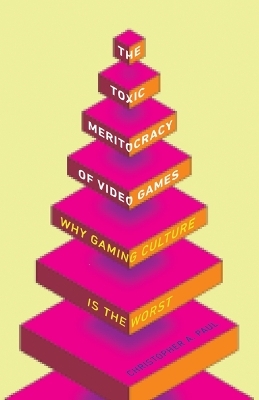
The Toxic Meritocracy of Video Games
Why Gaming Culture Is the Worst
Seiten
2018
University of Minnesota Press (Verlag)
978-1-5179-0040-3 (ISBN)
University of Minnesota Press (Verlag)
978-1-5179-0040-3 (ISBN)
An avid gamer and sharp media critic explains meritocracy’s negative contribution to video game culture—and what can be done about it
Video games have brought entertainment, education, and innovation to millions, but gaming also has its dark sides. From the deep-bred misogyny epitomized by GamerGate to the endemic malice of abusive player communities, gamer culture has had serious real-world repercussions, ranging from death threats to sexist industry practices and racist condemnations.
In The Toxic Meritocracy of Video Games, new media critic and longtime gamer Christopher A. Paul explains how video games’ focus on meritocracy empowers this negative culture. Paul first shows why meritocracy is integral to video-game design, narratives, and values. Games typically valorize skill and technique, and common video-game practices (such as leveling) build meritocratic thinking into the most basic premises. Video games are often assumed to have an even playing field, but they facilitate skill transfer from game to game, allowing certain players a built-in advantage.
The Toxic Meritocracy of Video Games identifies deep-seated challenges in the culture of video games—but all is not lost. As Paul argues, similarly meritocratic institutions like professional sports and higher education have found powerful remedies to alleviate their own toxic cultures, including active recruiting and strategies that promote values such as contingency, luck, and serendipity. These can be brought to the gamer universe, Paul contends, ultimately fostering a more diverse, accepting, and self-reflective culture that is not only good for gamers but good for video games as well.
Video games have brought entertainment, education, and innovation to millions, but gaming also has its dark sides. From the deep-bred misogyny epitomized by GamerGate to the endemic malice of abusive player communities, gamer culture has had serious real-world repercussions, ranging from death threats to sexist industry practices and racist condemnations.
In The Toxic Meritocracy of Video Games, new media critic and longtime gamer Christopher A. Paul explains how video games’ focus on meritocracy empowers this negative culture. Paul first shows why meritocracy is integral to video-game design, narratives, and values. Games typically valorize skill and technique, and common video-game practices (such as leveling) build meritocratic thinking into the most basic premises. Video games are often assumed to have an even playing field, but they facilitate skill transfer from game to game, allowing certain players a built-in advantage.
The Toxic Meritocracy of Video Games identifies deep-seated challenges in the culture of video games—but all is not lost. As Paul argues, similarly meritocratic institutions like professional sports and higher education have found powerful remedies to alleviate their own toxic cultures, including active recruiting and strategies that promote values such as contingency, luck, and serendipity. These can be brought to the gamer universe, Paul contends, ultimately fostering a more diverse, accepting, and self-reflective culture that is not only good for gamers but good for video games as well.
Christopher A. Paul is associate professor in the communication department at Seattle University. He is author of Wordplay and the Discourse of Video Games: Analyzing Words, Design, and Play.
Introduction: Growing Up Gamer
1. Leveling Up in Life: How Meritocracy Works in Society
2. A Toxic Culture: Studying Gaming’s Jerks
3. Coding Meritocracy: Norms of Game Design and Narrative
4. Judging Skill: From World of Warcraft to Kim Kardashian: Hollywood
5. Learning from Others
Conclusion: An Obligation to Do Better
Acknowledgments
Notes
Gameography
Index
| Erscheinungsdatum | 14.09.2018 |
|---|---|
| Verlagsort | Minnesota |
| Sprache | englisch |
| Maße | 140 x 216 mm |
| Themenwelt | Sachbuch/Ratgeber ► Freizeit / Hobby ► Fotografieren / Filmen |
| Mathematik / Informatik ► Informatik ► Web / Internet | |
| Sozialwissenschaften ► Kommunikation / Medien | |
| ISBN-10 | 1-5179-0040-9 / 1517900409 |
| ISBN-13 | 978-1-5179-0040-3 / 9781517900403 |
| Zustand | Neuware |
| Informationen gemäß Produktsicherheitsverordnung (GPSR) | |
| Haben Sie eine Frage zum Produkt? |
Mehr entdecken
aus dem Bereich
aus dem Bereich
Bilder machen, bearbeiten und verwalten mit Android-Handys und …
Buch | Softcover (2023)
dpunkt (Verlag)
24,90 €
Schwarzweißmotive erkennen und stimmungsvolle Bilder gestalten
Buch | Hardcover (2024)
dpunkt (Verlag)
49,90 €
der Leitfaden von den ersten Milchstraßen-Bildern zur …
Buch | Softcover (2023)
dpunkt (Verlag)
29,90 €


